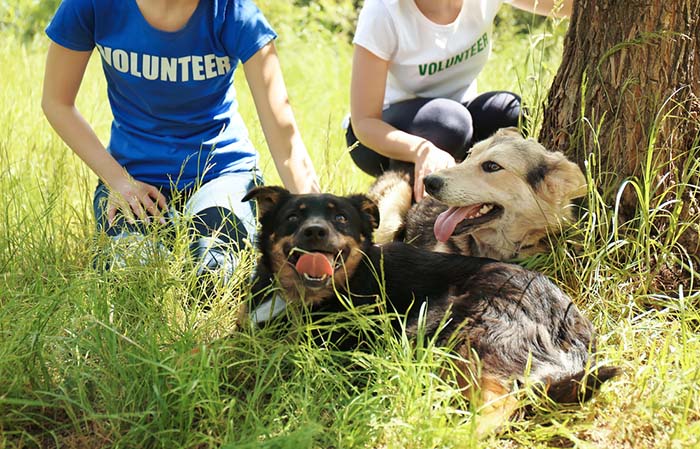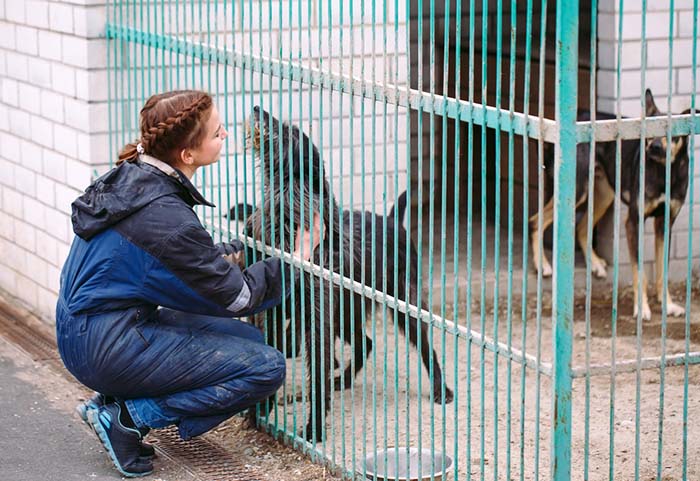Are you thinking of ways on how to give back to the world? What about providing some help to animal shelters and saving homeless pets?
If you’re an animal lover who has benefited from the loyalty and friendship of dogs, cats, and other pets, you can do something for millions of homeless animals and thousands of shelters. Here are 12 ways you can help:
1. Adopt, Don't Shop
Adopting a rescue is the most straightforward help you can deliver for homeless pets and shelters. You might have heard of countless heartwarming stories about lost pets that eventually find their forever home, and you might just be one of those that could inspire others to adopt a shelter animal rather than buy a pet from breeders.
For every shelter dog that becomes adopted, three lives will change — the dog's, yours and the other homeless pet's life that will take the place of your dog because there's now a vacant spot at the animal site. ASPCA statistics show that there's overpopulation at animal shelters so you're making a huge difference even if you adopt one pet.
2. Become a Foster Parent
If you're not sure whether you're ready to adopt a rescue dog or not, consider becoming a foster parent. When you temporarily take in a dog into your home, you help the shelter free up space for other rescues. Usually, pets that need to be fostered have more special needs than other animals.
For instance, you can foster a dog recovering from an injury or illness and nurse it back to health before it’s turned over to its new family. You can care for a dog mom and her puppies that aren't ready for adoption. If not for foster homes, these vulnerable animals would be the first to go in the shelters that practice euthanasia. Unfortunately, it's a necessary evil in some cases because the shelters do need the space.
3. Shun Irresponsible Breeding
But if you are already a pet owner, you can still help homeless pets and shelters by advocating for the end of irresponsible breeding through ways like puppy mills. You can also start by having your pets neutered or spayed, and share this moment on your social media to raise awareness among your friends and followers who might also own dogs or cats. If you plan to add more dogs to your family, you'll help shelters more if you adopt rather than breed.
You may consider spaying or neutering your pup after six months old because there's a good and bad time to spay/neuter a dog. For older dogs, talk to your veterinarian about its health, especially if your dog is a bit on the heavy side.
4. Microchip Your Pet
Studies reveal that 53 percent of pets that have been microchipped are returned to their owners after being lost. Meanwhile, only 2 percent of pets without microchip are ever reunited with their family. As a pet owner, you reduce the chances of contributing to the overpopulation of pets if you get your cat and dog microchipped. Don’t risk losing your pooch especially during events and holidays like the Fourth of July or New Year's Eve.
5. Advocate for Pets Who are Lost
Do your share by reporting stories of lost pets on your social accounts. Social media has helped thousands of pets over the last decade. Even if you don't know these animals or their owners, you are helping homeless pets and shelters by sharing their stories. If you spot a stray dog, be a conscientious neighbor by calling animal control and reporting the incident. Better yet, bring the dog to the local shelter yourself, if you are able to get closer or know how to handle stray dogs.
6. Educate Your Family and Friends
Raising awareness about the plight of homeless pets and shelters is an initial but significant step in helping change the system. Educating your friends and families about the realities of pets in shelters can likely make an impact, especially if they know that millions of dogs and cats are affected by this problem.
You might have neighbors who don't know that spaying or neutering is affordable, so tell them about it. Why not encourage your friends or family to visit local shelters and explain what a reputable breeder is compared to puppy mills? It might convince them to adopt a rescue dog, or at least buy one from a legitimate place.
7. Donate in Cash or Kind
This is another direct and effective way to help shelters remain in operation. Most of these sites lack the funding and supplies needed, so their main sources of income lie in donations and sponsorship, whether directly or through animal charities.
Typically, people donate pet food and other pet needs to shelters but you might also want to consider donating old but still useful office supplies and equipment, or old blankets, towels, and crates. You might also want to consider holding a pet shelter funding drive in your community to encourage others to donate.
8. Enlist the Community's Help
Reach out to other establishments and let them know about helping shelters. For instance, if you like a particular pet grooming service, consider asking the owner if they would be willing to volunteer their services to the shelter at least once a month. Tap the resources of a local chain store to donate supplies to the shelter. Take the initiative since shelter workers have too much on their hands already.
9. Show Your Appreciation
Not too many people realize that those who work in the shelters face many challenges every day but their pay and perks aren't enough. They do their best to help lost pets and they are witnesses to countless of sad plights as well. Sometimes, these shelter workers are so dedicated that they no longer have time for themselves. Show some appreciation by writing them thank you messages, or sending a bag of cupcakes at their place of work. If you're willing to go big, maybe give them gift cards for free massages or a treat them at a restaurant.
10. Offer Your Special Skill
Do you have superb administrative skills? Are you a capable Mr or Ms Fix-It? Shelters need all the help they can get in the day-to-day operations and you might have a particular skill that will greatly benefit their cause. Better still, why don't you round up people in your place of work, union, or industry, and ask them if they're willing to be part of outreach projects to benefit pet shelters?
11. Volunteer at the Shelters
If you can't donate in cash or kind, consider donating your time by volunteering and helping out at shelters. They might need more dog walkers or a staff who can watch over the pets at specific hours.
12. Be a Part of the Solution
This is the simplest thing you can do for homeless pets and shelters: become part of the solution and not the problem. You’ll make a significant contribution by doing at least half the tips on this list.
Mahatma Gandhi once said, “The greatness of a nation can be judged by the way its animals are treated.” One might say that as humans in charge here, we have the responsibility to take care of animals because we are the stewards of the Earth. Let's not give up on these animals and do our part.
READ NEXT: Breeder vs. Shelter – Where Should You Adopt a Dog?


















